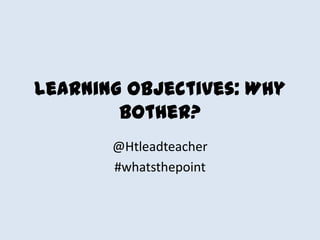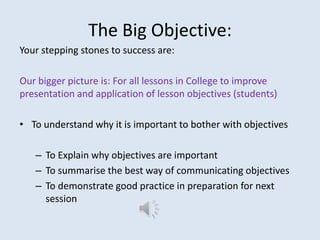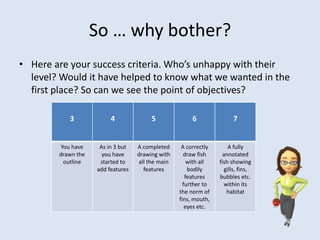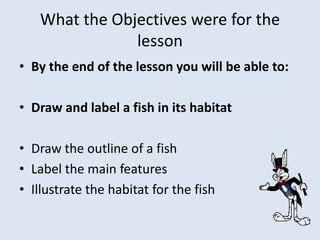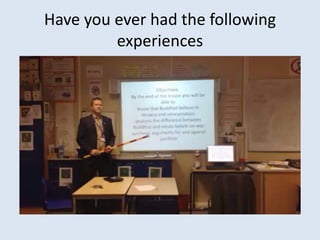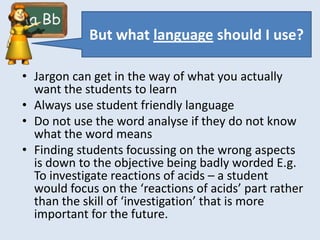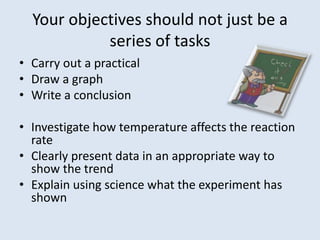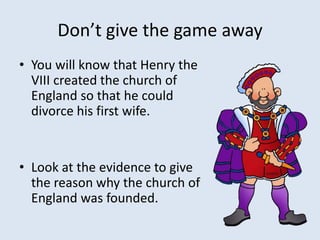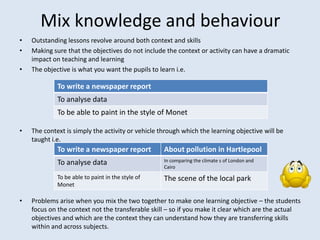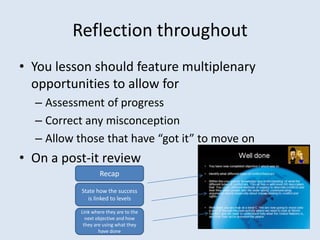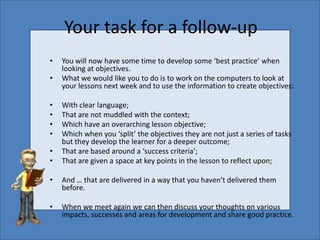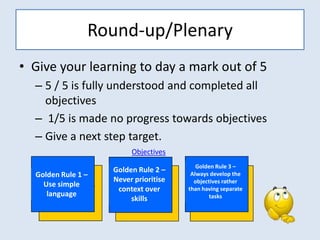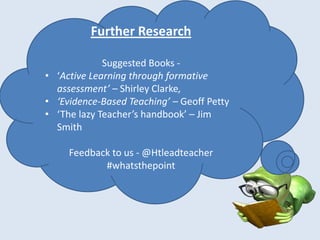Learning objectives powerpoint
- 2. Learning Objectives: Why bother? @Htleadteacher #whatsthepoint
- 3. The Big Objective: Your stepping stones to success are: Our bigger picture is: For all lessons in College to improve presentation and application of lesson objectives (students) • To understand why it is important to bother with objectives – To Explain why objectives are important – To summarise the best way of communicating objectives – To demonstrate good practice in preparation for next session
- 4. So … why bother? • Here are your success criteria. Who’s unhappy with their level? Would it have helped to know what we wanted in the first place? So can we see the point of objectives? 3 4 5 6 7 You have As in 3 but A completed A correctly A fully drawn the you have drawing with draw fish annotated outline started to all the main with all fish showing add features features bodily gills, fins, features bubbles etc. further to within its the norm of habitat fins, mouth, eyes etc.
- 5. What the Objectives were for the lesson • By the end of the lesson you will be able to: • Draw and label a fish in its habitat • Draw the outline of a fish • Label the main features • Illustrate the habitat for the fish
- 6. Have you ever had the following experiences
- 7. What we would expect from an objective • Think, Pair, Share. What worries you about learning objectives or what questions do you openly want to ask about them?
- 8. Different types of objectives Open Closed Long-term Short-term Describes skills where Describes skills or Describes the over- Describes what they are even if the success knowledge which are arching objective(s) for doing this lesson. criteria is given to the closed - either right or the topic/SoW/time at students there will always wrong. All knowledge school. be a difference in quality Learning Objectives are of work produced. closed E.g. Be able to write a E.g. Be able to know the E.g. Be able to punctuate E.g. Be able to use persuasive argument. key events of the correctly question marks gunpowder plot. You should have success You should not focus You should always have This should be one big criteria to avoid wholly on these for all the big picture and every objective which can be minimalistic approach. objectives lesson should be an over- split into differentiated Only if the success arching objective in itself pieces criteria are met can the objective be ticked off (this can however be ‘It’s great because we know what we are differentiated by doing now and all my learning is outcome) expanding’ – Nine-Year-Old
- 9. But what language should I use? • Jargon can get in the way of what you actually want the students to learn • Always use student friendly language • Do not use the word analyse if they do not know what the word means • Finding students focussing on the wrong aspects is down to the objective being badly worded E.g. To investigate reactions of acids – a student would focus on the ‘reactions of acids’ part rather than the skill of ‘investigation’ that is more important for the future.
- 10. Your objectives should not just be a series of tasks • Carry out a practical • Draw a graph • Write a conclusion • Investigate how temperature affects the reaction rate • Clearly present data in an appropriate way to show the trend • Explain using science what the experiment has shown
- 11. Don’t give the game away • You will know that Henry the VIII created the church of England so that he could divorce his first wife. • Look at the evidence to give the reason why the church of England was founded.
- 12. Mix knowledge and behaviour • Outstanding lessons revolve around both context and skills • Making sure that the objectives do not include the context or activity can have a dramatic impact on teaching and learning • The objective is what you want the pupils to learn i.e. To write a newspaper report To analyse data To be able to paint in the style of Monet • The context is simply the activity or vehicle through which the learning objective will be taught i.e. To write a newspaper report About pollution in Hartlepool To analyse data In comparing the climate s of London and Cairo To be able to paint in the style of The scene of the local park Monet • Problems arise when you mix the two together to make one learning objective – the students focus on the context not the transferable skill – so if you make it clear which are the actual objectives and which are the context they can understand how they are transferring skills within and across subjects.
- 13. Reflection throughout • You lesson should feature multiplenary opportunities to allow for – Assessment of progress – Correct any misconception – Allow those that have “got it” to move on • On a post-it review Recap State how the success is linked to levels Link where they are to the next objective and how they are using what they have done
- 14. How important are the success ‘I think success criteria? criteria help me because I know In order to have maximum impact, success criteria … what I need to do, and what I • Need to be known in a basic form and by teachers first need to do to • Should be the same for all learners in the class – differentiation improve my then occurs own work.’ Eight-year-old • Must be generated by pupils, or they have little meaning and less impact • Can be used across the curriculum (and make that link – teacher observation standards) • Need to be constantly referred to by the pupils and seek guidance • Again – One success criterion can be used as the focus for a lesson, broken down into further success criterion • Again – It needs to be part of a bigger picture in defining quality
- 15. Link to Objectives Prezi
- 16. Your task for a follow-up • You will now have some time to develop some ‘best practice’ when looking at objectives. • What we would like you to do is to work on the computers to look at your lessons next week and to use the information to create objectives: • With clear language; • That are not muddled with the context; • Which have an overarching lesson objective; • Which when you ‘split’ the objectives they are not just a series of tasks but they develop the learner for a deeper outcome; • That are based around a ‘success criteria’; • That are given a space at key points in the lesson to reflect upon; • And … that are delivered in a way that you haven’t delivered them before. • When we meet again we can then discuss your thoughts on various impacts, successes and areas for development and share good practice.
- 17. Round-up/Plenary • Give your learning to day a mark out of 5 – 5 / 5 is fully understood and completed all objectives – 1/5 is made no progress towards objectives – Give a next step target. Objectives Golden Rule 3 – Golden Rule 2 – Golden Rule 1 – Always develop the Never prioritise objectives rather Use simple context over than having separate language tasks skills
- 18. Further Research Suggested Books - • ‘Active Learning through formative assessment’ – Shirley Clarke, • ‘Evidence-Based Teaching’ – Geoff Petty • ‘The lazy Teacher’s handbook’ – Jim Smith Feedback to us - @Htleadteacher #whatsthepoint

